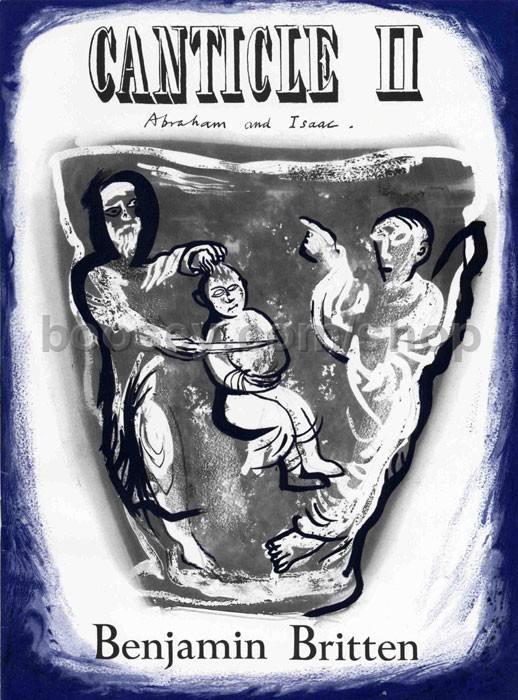by Daniel Hathaway

In fact, McElliott has had many opportunities to savor Benjamin Britten’s “Abraham and Isaac” together with his colleagues, tenor JR Fralick and pianist Todd Wilson. “We’ve performed it many times both at the Church of the Covenant and at Trinity Cathedral. At this point, it’s become an old friend.”
McElliott, Fralick, and Wilson will renew that friendship in the third of Music and Art at Trinity’s live streamed concerts this summer, an episode that will air in real time with no audience present on Friday, September 18 at 7:00 pm. The program, “Music by Three B’s,” will include Nadia Boulanger’s Three Improvisations, played by organist Nicole Keller, and Brahms’ Violin Sonata in A, performed by Andrew Sords with pianist Elizabeth DeMio. The event is free, but donations are welcome toward a COVID-19 musicians relief fund.
Britten wrote his five Canticles between 1947 and 1974. Though the titles suggest liturgical works, they’re more like little cantatas for various combinations of voices and instruments. Three of them were crafted as memorials, and all five reflect the composer’s knack for setting fine examples of English literature to highly expressive music.
Canticle II tells the disturbing story from the Book of Genesis where God challenges the patriarch Abraham to sacrifice Isaac, his only son, to show his obedience to the divine will. But rather than setting the scriptural words, Britten uses a text from the Chester Mystery Plays, a cycle of 25 dramas performed in the town of Chester during the 14th century that also provided Britten with the libretto for his intergenerational opera Noye’s Fludde.

One of Britten’s master strokes was setting the words of God as a close, homophonic duet between the other characters rather than introducing a third voice. “It’s cool that the words of God are coming through the two protagonists. In some of our performances, JR and I have turned away when God speaks, which can be haunting and effective, but might not translate to a video performance,” McElliott said.
Another Brittten inspiration was to reuse some of the Canticle II music in the War Requiem he wrote for the opening of Coventry Cathedral. He introduces it during his setting of Wilfrid Owen’s poem The Parable of the Old Man and the Young:
So Abram rose, and clave the wood, and went,
And took the fire with him, and a knife.
And as they sojourned both of them together,
Isaac the first-born spake and said, My Father,
Behold the preparations, fire and iron,
But where the lamb for this burnt-offering?
Then Abram bound the youth with belts and straps,
and builded parapets and trenches there,
And stretchèd forth the knife to slay his son.
When lo! an angel called him out of heaven,
Saying, Lay not thy hand upon the lad,
Neither do anything to him. Behold,
A ram, caught in a thicket by its horns;
Offer the Ram of Pride instead of him.
But the old man would not so, but slew his son,
And half the seed of Europe, one by one.
Although Canticle II was written for and first performed by contralto Kathleen Ferrier (with tenor Peter Pears and Britten at the piano), the high voice is frequently performed by a countertenor — like John McElliott. How did he take up that very special voice part in the first place?
“I grew up singing treble in the Men and Boys Choir at St. Paul’s in Akron, and countertenor just sort of happened in the natural progression of things. When I went through the change of voice, the normal modus operandi for ‘fallen trebles’ was to sit at the alto end of the row and just cool it for a while.”
The majority of post-pubescent male singers end up as tenors and basses, but McElliott was destined for higher things. “Once my voice settled, when I was 20 or 21, I found that I could sing high C’s again.”
In 1991, John McElliott was chosen to sing the boy alto solo in Leonard Bernstein’s Chichester Psalms with The Cleveland Orchestra under Gareth Morell at Blossom. Todd Wilson heard him and invited him to sing in the work at the Church of the Covenant, where Wilson was music director at the time. Wilson’s assistant conductor was Karen McFarlane (later Holtkamp), who ran one of the country’s premier management houses for organists and choir tours. She told McElliott he should sing for some English cathedral conductors.
That led to his meeting Winchester Cathedral choirmaster David Hill, who invited him to sing as a lay clerk for a year, and eventually, at Hill’s suggestion, to his taking over Karen McFarlane Artists, Inc. when McFarlane stepped aside.
“That was never something on my radar, but it’s been a good fit,” he said. “Luckily, I could continue to sing at the Covenant and later at Trinity Cathedral while doing the management job. I even went back to St. Paul’s for four years when my son Joshua was a treble in the choir.” McElliott also finds time to sing with Apollo’s Fire, and is a founding member of Quire Cleveland.
The lives of both artist managers and singers have changed radically with the onset of the pandemic. “The last six months have been crazy, crazy times,” McElliott said. “In April, we had to cancel the Notre Dame Cathedral Choir’s U.S. tour exactly a year after the fire in Paris, and we had ten of our artists scheduled to play in Atlanta at the national convention of the American Guild of Organists in July. But things are coming back very slowly. There’s an urgent need for live performances, and when they return, people are just going to eat them up.”
Click here at 7:00 pm on Friday, September 18 to live stream “Music by Three B’s” from Trinity Cathedral.
Published on ClevelandClassical.com September 15, 2020
Click here for a printable copy of this article



